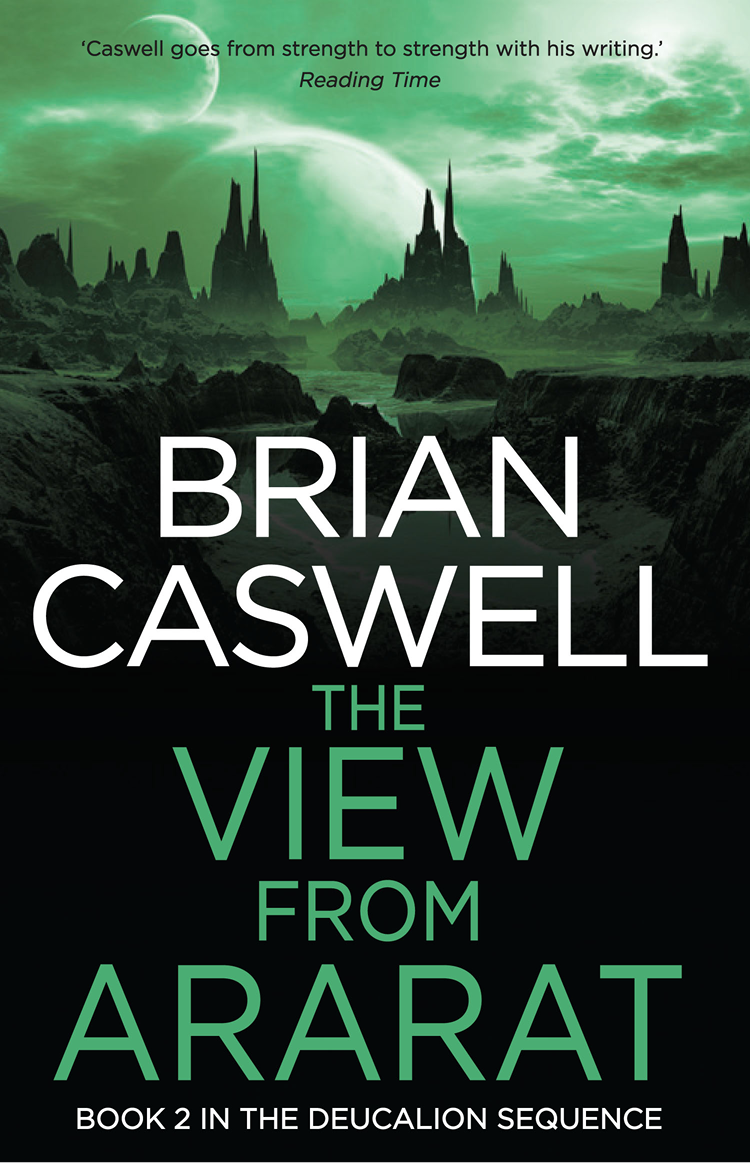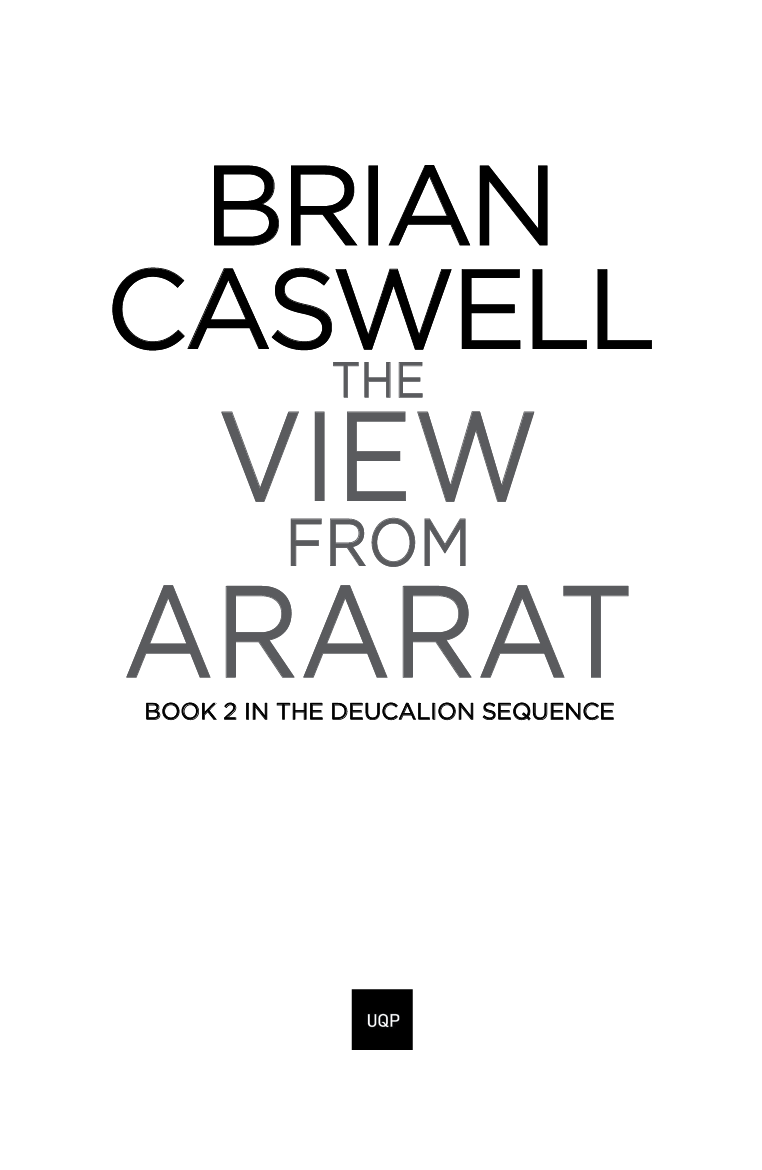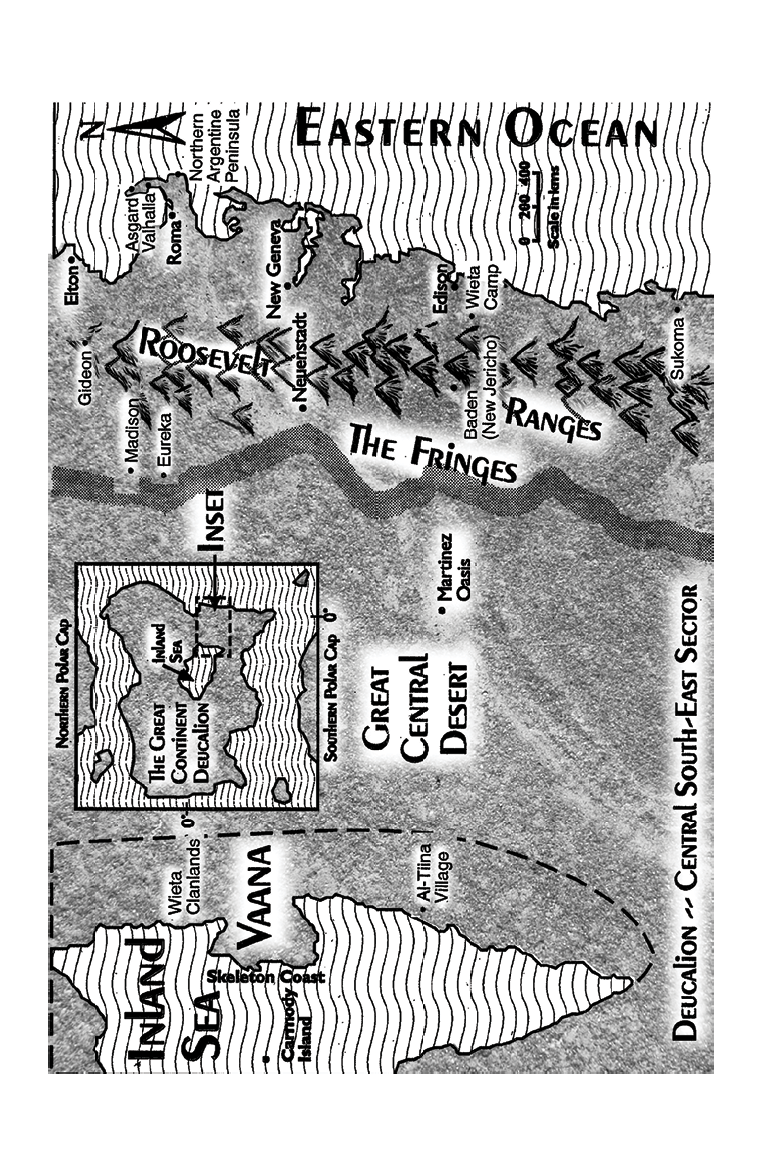View from Ararat
Authors: Brian Caswell


 Since 1989, Brian Caswell has written 31 books including the best-selling
Since 1989, Brian Caswell has written 31 books including the best-selling
A Cage of Butterflies
. His work has received numerous awards and shortlistings, including the Children's Peace Literature Award, the Vision Australia, Young Adult Audio Book of the Year Award, the Aurealis Award, the Australian Multicultural Children's Literature Award, the Human Rights Award, the NSW Premier's Literary Awards (four times), and he has been included in the prestigious International Youth Library's âWhite Ravens' list four times. All his published novels have been listed as Notable Books by the Children's Book Council of Australia.
He also researches and designs âcutting-edge' educational and personal-development programs, listens to all kinds of music (usually far too loud), watches âan excessive number' of movies and DVDs, and reads âanything with words on it'. Brian lives on the NSW Central Coast with his wife, Marlene, and his dog, Indy. He has four children and 13 grandchildren.
Also by Brian Caswell
Deucalion Series
Deucalion
The Dreams of the Chosen
Young Adult
Merryll of the Stones
Dreamslip
A Cage of Butterflies
A Dream of Stars
(short stories)
Asturias
Double Exposure
Loop
By Brian Caswell and David Phu Au Chiem
Only the Heart
The Full Story
Younger Readers
Mike
Lisdalia
Maddie
Relax Max!
Alien Zones Series
Teedee and the Collectors or How It All Began
Messengers of the Great Orff
Gladiators in the Holo-Colosseum
Gargantua
What Were the Gremnholz Dimensions Again?
Whispers from the Shibboleth

To Barbara, Felicity, Isobelle and Ray for your important input during the writing and rewriting of this, my most difficult project. Thank you for your support and your willingness to share your special talents.
And, of course, to Marlene, my wife, who is learning to appreciate the world and her husband â at 3am.
As long as the generations continue,
the memories must live.
As long as the memories live,
so the generations must continue.
The Lastsong of the Tellers

Prologue
Before the Telling . . .
Plaza Complex
New Geneva (Central)
Deucalion
10/12/213
NATASSIA'S STORY
Words. I've lived my entire life surrounded by them.
My first clear memory is of my mother reading to me from a small hand-held book-screen â a kid's story about the Elokoi hero Gaita, who led her people on the Great Trek across the desolation of the Central Desert, in the time before Time.
I loved the pictures â 3-D renderings of famous Elokoi history walls, animated (in a culturally inappropriate way, of course) especially for human consumption.
Naturally, I was too young to appreciate the fact at the time. I just remember the experience: my mother, her gentle voice rising and falling; the way she wet her lips with the end of her tongue when she stopped reading to show me something.
And the words. Always the words, weaving their spell over me. Painting their own pictures on the wall of my tiny imagination.
I think I was the only kid in my kindergarten class at the Edison central edu-centre who actually knew the stories. The Tellers, who visited the edu-centres three or four times a year, taught the older kids (at least, they tried to) about the Elokoi ways, but the ankle-biters were considered too young to benefit from such âcultural extension'.
I guess my family was always a bit different. From the beginning, we were a clan obsessed with words.
Two hundred years ago my ancestor AJL Tolhurst was probably Deucalion's most famous early-colonial historian. Some say he was Deucalion's
only
early-colonial historian, because he was the only one who bothered to tell the story of the colonisation and include any real understanding of the Elokoi, and our effect on their way of life.
He lived for a long time with the Naashti Clan in the far north, near what is now Elton, learning what he could of their culture, and documenting the disaster that the arrival of the offworlders represented to their traditional way of life.
He was a great man, universally acknowledged.
But it was his granddaughter, my great-grandmother, who had the most significant influence on me, and on the course that the rest of my life would eventually take. If I hadn't been so fascinated with her story, I might have gone into Research at an early age, instead of spending my life defining and redefining my world in words.
Her name was Rachael. Rachael Tolhurst. But everyone called her RJ. I guess it had something to do with the books. There were eighteen in all, mostly politics and socio-political history, especially her two-volume autobiography,
Memoirs of a Teenage Revolutionary
, which was by far her most famous work.
She was a pretty amazing woman, RJ.
She died in her sleep in 186, just two weeks after I was born. She was a hundred and one years old Standard. About a hundred and twenty-four in Old Earth years. Which is old by anyone's reckoning.
But that wasn't what made her amazing.
It was what she did with her life when she wasn't writing books that was so impressive. I mean, for most women being an author with so many works in the Archives, and being married to one of the heroes of the Revolution of 101, might have been enough.
Then again, for most men
being
one of the heroes of the Revolution might have been enough. You could easily dine out on it for the rest of your life.
But it wasn't enough. For either of them.
My great-grandfather's name was Daryl Newman.
Newman
. . .
Even as a kid I remember thinking it was funny, one of the fathers of the new democracy having a name like that.
They were pretty unique, the pair of them.
After the Revolution and the Second Great Trek, when the Elokoi set up their own independent state, Vaana, around the eastern shores of the inland sea, my great-grandparents lived with them.
Daryl died in 155. Right up to the end he was working with the Elokoi, overseeing the workings of the cooperatives that traded Capyjou and Ocra tea with the human government in New Geneva and with the Deucalion Export and Import Board, which oversaw all trade between the Republic and Old Earth.
RJ worked with him, writing when she could, but spending most of her time helping to coordinate the trade.
The pair acted as the main link â commercial and diplomatic â between Human and Elokoi for the best part of half a century. And they were an essential link, for trade was not a concept that the Elokoi found easy to relate to in the early years.
For a culture which owned everything communally, the idea of giving one thing in return for another held no meaning. And as for giving in return for money, that concept was as alien to them as . . . war.
Before the coming of the offworlders, the Elokoi had only ever cultivated the crops for their own use, and they could probably have returned to the old ways entirely, except for the fact that Vaana was about the most inhospitable place you could ever wish to settle, and the cost of the massive irrigation and desalination programs necessary to make it habitable â even for the hardy Elokoi â was far beyond the resources of the new state.
It had to develop some way of generating income.
The government of the new Republic, recognising the problem, did offer to fund the programs, but the Elokoi refused the offer â which is understandable.
After a century of having their heritage and culture eroded by human interference, they were unwilling to take the risk a second time â no matter how well intentioned the offer was.
But Daryl was
nyassa
â kin â an honorary clan-member. They trusted him completely, and when he suggested the cooperatives and trading in the two valuable plantation crops, they saw the sense in a small compromise. They borrowed the funds from the New G government to begin the irrigation program, and seeded the first plantations. Then they used the considerable profits from the early crops to repay the loans and fund the next stage.
By 150 or so Vaana was already being called the âGarden of the West'. The demand for Capyjou and Ocra was growing â especially from Earth â and the Elokoi state was economically self-sufficient. But apart from the technology necessary for maintaining the fertility of their new state, the Elokoi lived as simply and communally as they always had, and, apart from the activities of the travelling Tellers, they maintained very little direct contact with their human neighbours to the east.
Of course, all that was years before I was born.
The first time I considered the possibility of following in the Tolhurst family writing tradition, I was . . . what, ten? Eleven maybe. I remember watching Taal, the Elokoi Teller, standing there in front of our entire year group, sharing one of the sacred Stories with a crowd of human âcubs', who sat there, totally rapt, listening to the words weaving their spell into the air around them, and into their imaginations.
My mother had read me most of the Stories, of course. RJ herself had translated many of them, and we had the original reader-disks. But my mother had also explained how little true understandings could be communicated by words alone.
Elokoi Thoughtsongs were so much more than words could reproduce, she said. Beautiful and moving as the Stories might seem in wordspeech, they were nothing compared with what an Elokoi could experience in a true Telling, mind to mind. Which was something we were forever shut off from.
Our words, she said, were like the surface of the sea, stretching away to the horizon. We could experience the reflections, the movement of the waves, even the chill of an onshore wind, but the ocean depths, with their currents and their hidden secrets â they were forever a mystery.
I was thinking of that as the Teller spoke, and I remember looking at him and feeling . . . not jealous, but determined. Even if words could never match a shared Thoughtsong, they were the best that we humans could do, and even if I could do no more than make people feel what I was feeling at that moment, then maybe words might be enough.
Of course, I was young. As I grew up, I became less of an idealist. I became a journalist after all. But I never lost that love for words.
And so I await tonight's Telling with mixed emotions.
Me, a creature of words, a floater on the surface of the ocean, contemplating my first dive beneath the familiar surface. What will I see there, feel there?
Will words ever be quite enough again?
It's not such an idle question, when you consider what tonight promises.
Or what it commemorates.
The Crystal Death.
The Creeping Apocalypse.
The End â and the Beginning.
For ten years I have lived with it, turned it over and around, tried to come to terms with the enormity of it. I have even used my precious words to write a book about it, to try to make sense of it.
But I know, in my heart, that there are depths I do not have the words to show. For if ever a story needed more than words, this is that story.
It is in the nature of words to make connections. It is in the nature of a story to find its own voice.
But when we die â we who lived it, we who ultimately survived â who will really remember? For all the volumes written, all the minutely researched accounts of events, deep down at the core of their understanding, who will know?
The terror of the riots. The staring eyes of a dying child. The smell of death. The racing of the pulse.
The overwhelming fear.
Who will even remember how it all began?